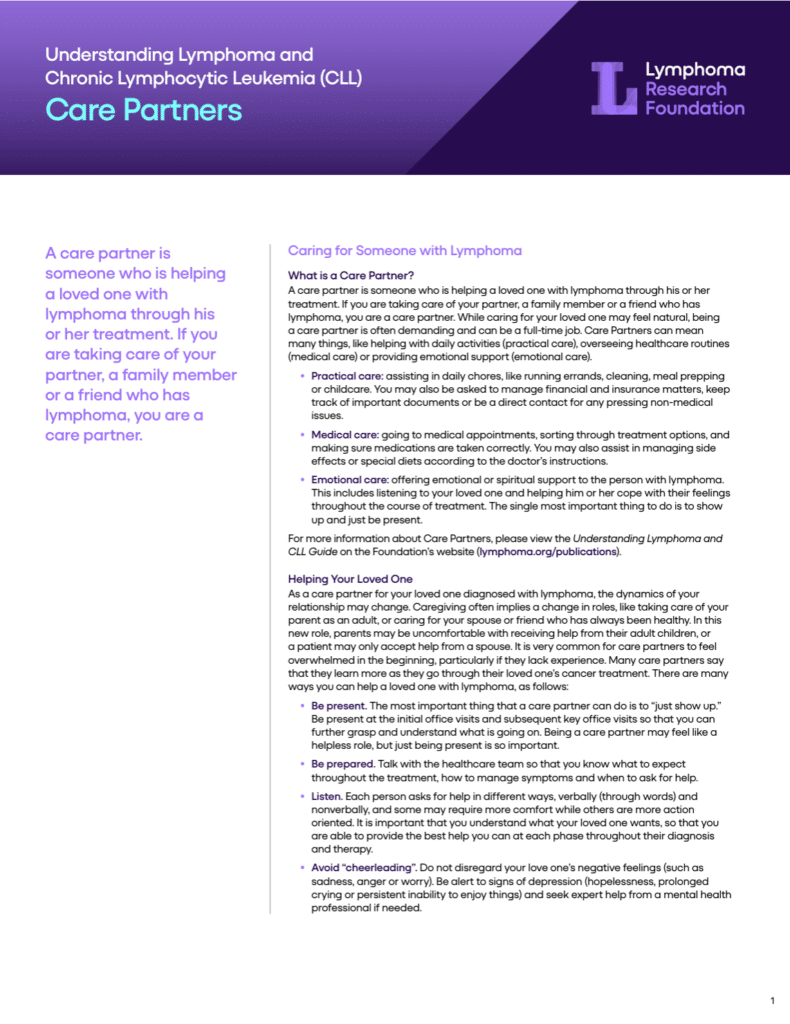Care Partner vs. Caregiver:
Why Language Matters in Lymphoma Support

When a loved one is diagnosed with lymphoma, the individuals who support them play a crucial role in their journey. Historically, these individuals have been referred to as “caregivers,” but in recent years, the term “care partner” has emerged as a more empowering and inclusive alternative.
The words we use to describe roles in the cancer community matter, which is why the Lymphoma Research Foundation feels that the term “care partner” is a more meaningful and reflective term for those providing support to someone with lymphoma.
The Power of Partnership
The term “caregiver” suggests a one-way relationship—someone giving care to another who passively receives it. While lymphoma can be physically and emotionally demanding, patients remain active participants in their own care – and care partners often carry more responsibility. Responsibilities of care partners may vary but can range from attending doctor visits, keeping track of medication, providing transportation to treatments, assisting with childcare responsibilities, and providing emotional support. The term “care partner” acknowledges the mutual exchange of support, respect, and decision-making between the patient and their loved one.
Building a Supportive Mindset
Just as much as patients need a support system, so do care partners. Care partners often experience stress, anxiety, and emotional fatigue. While it seems counterintuitive, a diagnosis of cancer can be harder on the care partner than it is on the patient. According to a study published by the National Alliance for Caregiving, cancer caregivers spend an average of 32.9 hours a week providing care to their loved ones. As a result, caregivers reported experiencing increased anxiety, depression, fatigue, and other emotional stress—with more than 50 percent of caregivers rating their stress level as “highly stressed.” Recognizing them as partners rather than sole providers of care reinforces that they, too, deserve support, resources, and self-care.
Empowering Patients
Receiving a lymphoma diagnosis can be overwhelming, and the ability to maintain autonomy is often critical to a patient’s well-being. The term “care partner” reinforces the idea that individuals with lymphoma are not passive recipients of care but active participants in their treatment and overall care. Being labeled as solely a “receiver” of care can feel disempowering and can be especially important for people who struggle with the feeling of being a “burden.” Recognizing the care relationship as a partnership highlights that both individuals contribute to each other’s well-being in different ways.
The Lymphoma Research Foundation’s Shift to “Care Partner”
While we understand that “caregiver” is still a widely used term that is recognized by many as standard terminology, the Foundation will begin to make the shift from “caregiver” to “care partner” in the hope of creating a more compassionate and inclusive environment for both patients and those who care for them. We believe it reflects a more accurate and compassionate understanding of the relationship between people living with lymphoma and those supporting them. When navigating lymphoma, no one should walk alone and all those impacted by a diagnosis should know that resources exist to support them on their journey —and that is exactly what being a care partner is all about.

Download our Care Partner fact sheet for more information about caring for someone with lymphoma.

As a care partner, one of the biggest challenges is assuming the emotional burden of everything that is happening all around you — it can be a lot… It helps to know you’re not alone in something like this, and I encourage anyone facing a lymphoma diagnosis to find some type of community of people that you can talk to who have been through similar experiences.
– Alex, Care Partner

